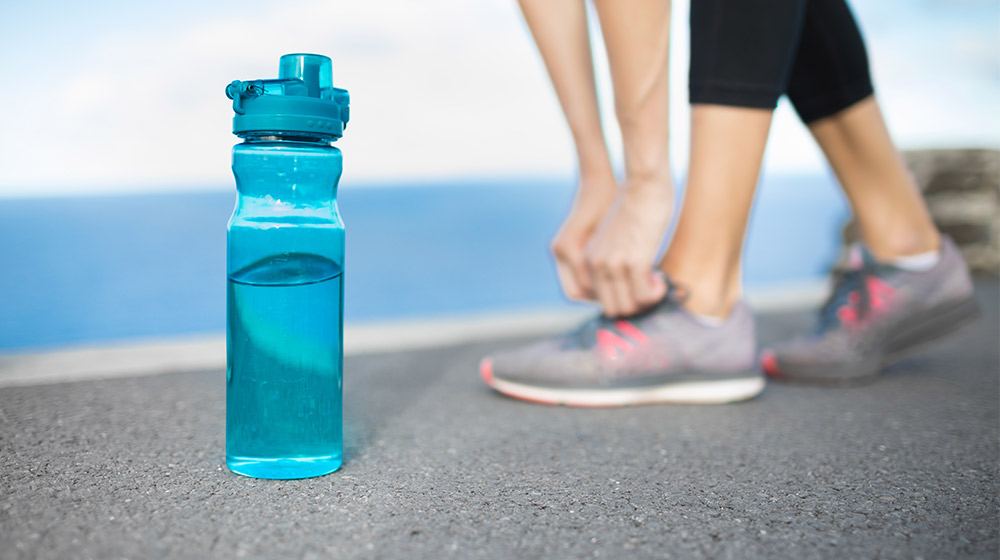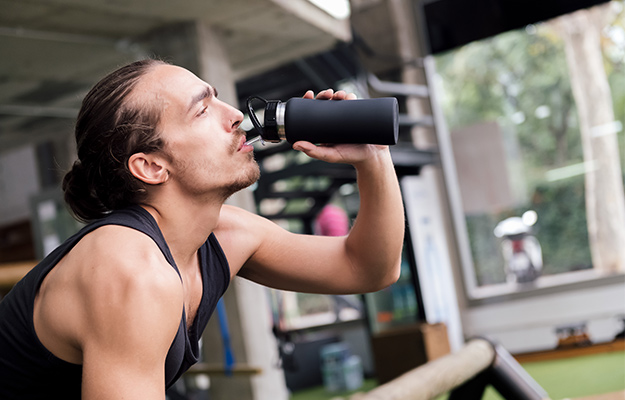Overview
Did you know that our bodies are 75% water?
Water isn’t just a thirst quencher. It’s a life-giver.
For athletes, water is their secret weapon. Why? Muscles are a crucial part that fuels an athlete’s performance. And guess how much water there is in the muscles? It’s also 75%.
Not only does water help athletes perform at their peak, but it also prevents dehydration, which can seriously impact their performance.
That’s why staying hydrated is vital!
Meanwhile, dehydration causes a decrease in blood volume, which means less oxygen gets to the muscles. And that’s when the cramps and fatigue kick in, making it impossible for athletes to give their best performance.
Not to mention the cognitive impairment dehydration can cause, resulting in confusion, irritability, and a lack of focus.
This article discusses the importance of water for athletes who require regular fluid intake to compensate for their massive water loss level, explains exercise-induced dehydration, and shows how to prevent dehydration before, during, and after exercise.
Stay Hydrated, Athletes! Learn the Impact of Dehydration on Performance
What Happens When We Exercise?
When we exercise, our bodies undergo a series of physiological changes to meet the demands of physical activity.
Our muscles require more energy, supplied by the breakdown of glucose and fats. This process increases the production of carbon dioxide (CO2) and heat, causing our body’s temperature to rise. If the body reaches its heat limit, meaning the temperature continuing to increase will cause overheating, it needs to cool off through perspiration.
Sweating or perspiration is the body’s way of regulating its temperature. Sweat glands all over the body release a liquid mixture of water, salt, and electrolytes onto the skin’s surface. As the sweat evaporates, it carries away heat and lowers the body’s temperature.
However, excessive sweating can cause dehydration, leading to various problems.
Dehydration happens when the body loses more fluid than it consumes. This phenomenon can occur when we don’t drink enough water, especially during and after prolonged or intense exercise. Dehydration causes fatigue, muscle cramps, dizziness, and even heat stroke or heat exhaustion, which can be life-threatening.
What Does Exercise-induced Dehydration Mean?
One of the most predominant targets of dehydration is athletes, who lose a massive amount of fluid due to intense physical activity. This event is called exercise-induced dehydration, typically occurring during and after training.
According to the American College of Sports Medicine, a water loss of only 2% of body weight can result in dehydration, significantly affecting performance and increasing the risk of heat exhaustion or heat stroke.
Exercise-induced dehydration is a common problem, with research indicating that up to 28% of Americans experience some degree of dehydration during workouts, making it a frequent cause of hospital admission.
Also, a study published in the Journal of Athletic Training found that college athletes had a high prevalence of dehydration, with 20% of male and 34% of female athletes experiencing it during practice or competition.
Professional athletes are particularly vulnerable to exercise-induced dehydration, as their intense training regimens and competition schedules require them to perform at their highest levels under physical stress.
As a result, athletes must be aware of the risks of dehydration and take appropriate measures to prevent it. In other words, dehydration prevention strategies should be critical to every training regimen and competition schedule.
How Do You Know You Are Dehydrated?
![]()
Paying attention to the signs and symptoms of dehydration is equal to preventing serious health risks.
Monitoring your urine color is the easiest way to tell if you’re dehydrated. For example, dehydration occurs if your urine is dark yellow or amber-colored.
Other signs and symptoms of dehydration during exercise include:
- Thirst: Feeling thirsty is the body’s way of telling you it needs more water.
- Dryness: You may experience a dry mouth and throat when dehydrated.
- Fatigue: Dehydration can cause fatigue, weakness, and dizziness.
- Headache: Dehydration can cause a headache, which may worsen with movement.
- Muscle cramps: Dehydration can cause muscle cramps in the legs and arms.
- Nausea and vomiting: Dehydration can cause nausea and vomiting, especially during intense exercise.
- Rapid heartbeat and breathing: When dehydrated, your heart may beat faster, and your breathing may become shallow.
- Dark circles under the eyes: Dehydration can cause dark circles under the eyes.
- Reduced urine output: Dehydration can reduce urine output, which may be darker when urinating.
How Does Dehydration Affect Performance?
Physical Performance
Studies have shown that even mild dehydration can lead to decreased physical performance and an increased risk of injury among athletes.
A study published in the Journal of Athletic Training found that dehydration negatively impacted the performance of college athletes during practices and games.
The study showed that dehydrated athletes had a higher heart rate (extra 3 to 5 beats per minute for every 1% body weight loss due to water loss), increased fatigue, lower cardiac output and arterial pressure, and lower overall performance than hydrated athletes.
Another study published in Nutrition Reviews found that dehydrated endurance athletes, in the range of 2.6% to 5.6% body weight, experienced a decrease in short-duration (5 to 30 minutes) and high-intensity exercise performance.
The study also discovered that, over a threshold of 3.1%, each percent loss in body weight results in a 2.9% reduction in maximal oxygen use. Moreover, a 2.3% pre-exercise body weight drop reduced time-trial running performance compared to a hydrated condition.
Cognitive Performance
According to research, the severity of dehydration may influence how badly cognitive function is affected.
For example, women’s mood characteristics, including vigor, alertness, tiredness, calmness, confusion, and happiness, are significantly impacted during water deprivation. Also, children drinking insufficient water may experience temporary cognitive decline.
Meanwhile, increased water consumption has been linked to improved visual attentiveness and short-term memory in long-distance runners and walkers.
However, the bigger problem is that only a 2% loss of a person’s body weight is enough to cause all those impairments to human cognition. For a 150-pound person, this amount corresponds to a body weight loss of 3 lbs, which is usual after everyday exercise.
As a result, athletes experiencing dehydration may also suffer from poor concentration, a longer reaction time, issues with short-term memory, irritability, and anxiety.
Best Ways to Rehydrate After Exercise
After exercise, it’s crucial to rehydrate your body to restore the fluids lost during physical activity. Proper rehydration not only helps with muscle recovery but also helps maintain cognitive function and prevents the risk of dehydration-related conditions.
The best way to rehydrate is to drink water or a sports drink containing electrolytes.
Why are electrolytes crucial? The body’s fluid balance is regulated by electrolytes, which include sodium and potassium. These electrolytes must be replenished for optimum hydration as they are lost through sweating during exercise.
If you’re engaging in prolonged and intense exercise, drinking a sports drink can be a better option as it contains a higher concentration of electrolytes than water. Still, water is enough for most people engaging in moderate workouts to rehydrate the body.
While drinking water is essential for rehydration, it’s also crucial to replenish lost nutrients through food. Eating foods containing a high amount of water, such as fruits and vegetables, can help rehydrate the body while providing essential vitamins and minerals.
Remember to drink slowly and continuously rather than chugging a large amount at once. This approach helps the body absorb the water more efficiently.
How to Prevent Dehydration Before Exercise
Ideally, individuals should consume fluids 2 to 4 hours before exercise and continue to hydrate until the start of their workout.
Consume at least 17 to 20 ounces (500 to 600 ml) of water 2 to 3 hours before exercise. Then, drink another 7 to 10 ounces (200 to 300 ml) of water 20 minutes before training to ensure proper hydration.
It’s also important to consider the environmental factors and intensity of exercise when determining how much fluid to consume. For example, drink more fluids in hot or humid conditions or for intense training to compensate for increased sweating and fluid loss.
Bottom Line
Exercise is essential for maintaining a healthy body, but it’s crucial to understand the risks of dehydration. Sweating is a natural process that regulates the body’s temperature during exercise but can also result in water and electrolyte losses.
Therefore, staying hydrated is critical to avoid the harmful effects of dehydration, such as fatigue, muscle cramps, heat stroke, and even cognitive impairments.
Whether you’re a professional athlete or a fitness enthusiast, don’t forget to drink water regularly. It’s the secret to performing at your best! And remember, if you’re thirsty, you’re already dehydrated, so keep a water bottle close by and sip away!
Stay hydrated! Your body will thank you for it.
References
Casa, D. et al. (2000). National Athletic Trainers’ Association Position Statement: Fluid Replacement for Athletes. Journal of Athletic Training.
Goulet, E. (2012). Dehydration and Endurance Performance in Competitive Athletes. Nutrition Reviews.
Riebl, S. and Davy, B. (2013). The Hydration Equation: Update on Water Balance and Cognitive Performance. American College of Sports Medicine.
Taylor, K. and Jones, E. (2022). Adult Dehydration.
If you have questions about dehydration and performance or any health problems discussed here, connect with us and learn more.
At Peak Human, our team of healthcare professionals helps you reach your ‘peak’ health with a custom whole-person approach. Using the most cutting-edge, science-backed biohacking and aesthetic tools available today, we help you achieve the highest physical/cognitive performance state, improving your overall quality of life.
Don’t hesitate to contact us for questions or to book an appointment. Get personalized support and insight from expert physicians.
UP NEXT:
- Does Alcohol Kill Gains? The Relationship Between Alcohol and Fitness
- How Does Exercise Help Reduce Alcohol Consumption?
- 5 Benefits of High-intensity Interval Training





